OneSkin offers a line of skincare and longevity products that leverage the proprietary OS-01 peptide, which the company claims can improve skin health on the molecular level.
I’m not a beauty influencer and I’m not too concerned about the normal signs of aging. However, I’ve realized that despite my best efforts, modern life exposes my skin to environmental stressors and toxins that can speed up the normal aging process.
So for this review, I used OneSkin’s OS-01 face and body lotions for several weeks to see if they could change the appearance of my skin. Additionally, I dug into the scientific literature to learn more about the mechanisms of action behind the OS-01 peptide.
I was beyond surprised by the positive results, which you can see in my before and after photos (below).
Specifically, I’m enjoying firmer skin, a reduction in fine lines and wrinkles, and fewer dark spots. As a result, I’m still using OneSkin products daily, two years after initially publishing this article.
My OneSkin Experience and Results
I was 41 years old when I wrote the first version of this review and took my before-and-after photos, and I didn’t expect OneSkin to turn my skin into that of a 20-year-old. In fact, I didn’t really know what to expect, because I was happy overall with the appearance of my skin.
As part of my testing, I used OneSkin’s face (OS-01 FACE) and body (OS-01 BODY) lotions, applying the products twice per day (morning and evening) as directed.
I also always applied OneSkin after washing my face, as the company’s lab testing has revealed that using the product on clean skin can improve the absorption rate by 50%. You can use OneSkin PREP (the brand’s facial cleanser) or any other non-toxic cleanser of your choice.
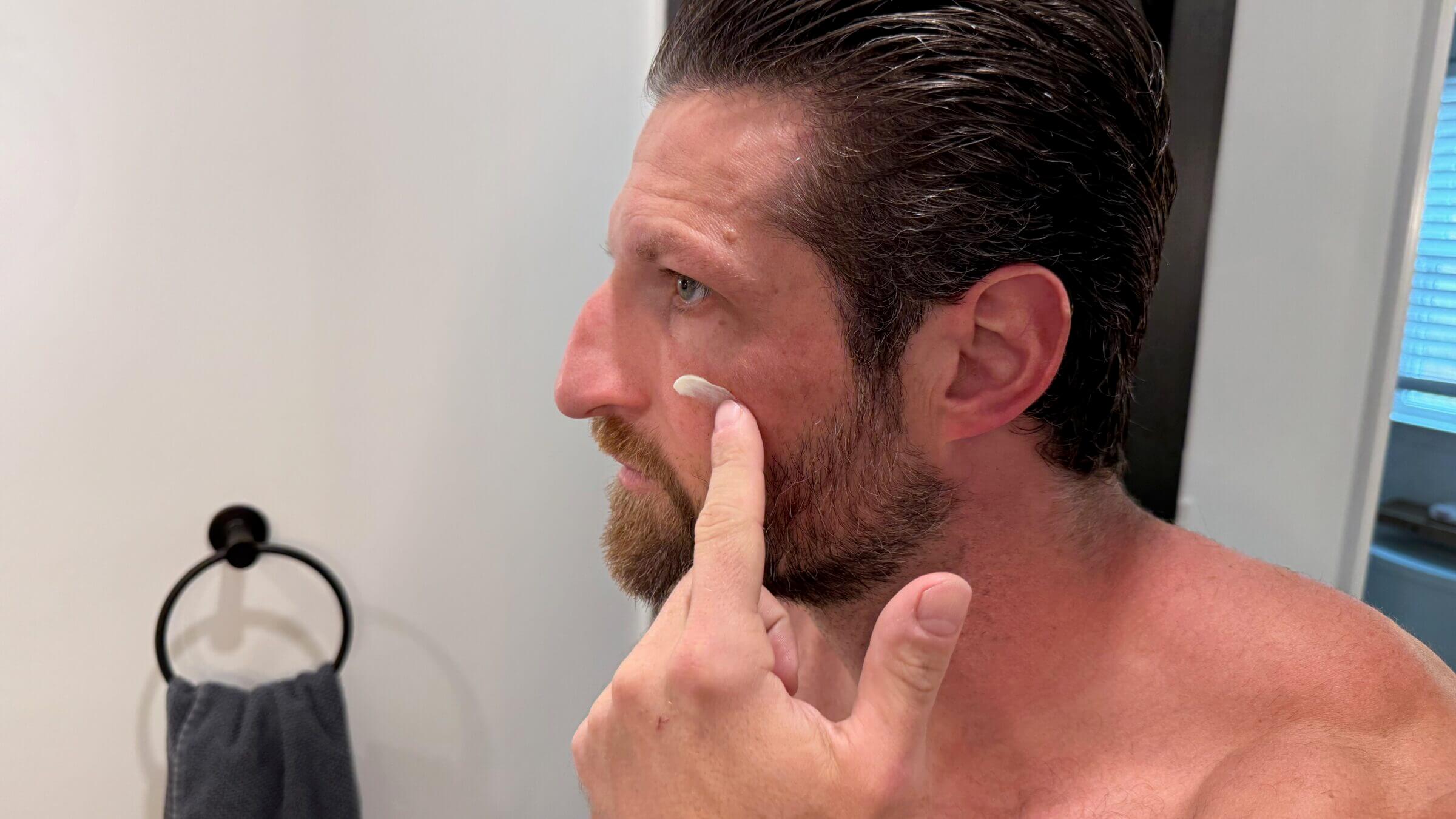
When considering my results, keep in mind that I consume a relatively healthy diet that’s devoid of inflammatory foods such as seed oils and processed carbohydrates. I’ve also never smoked, but I usually don’t wear sunscreen.
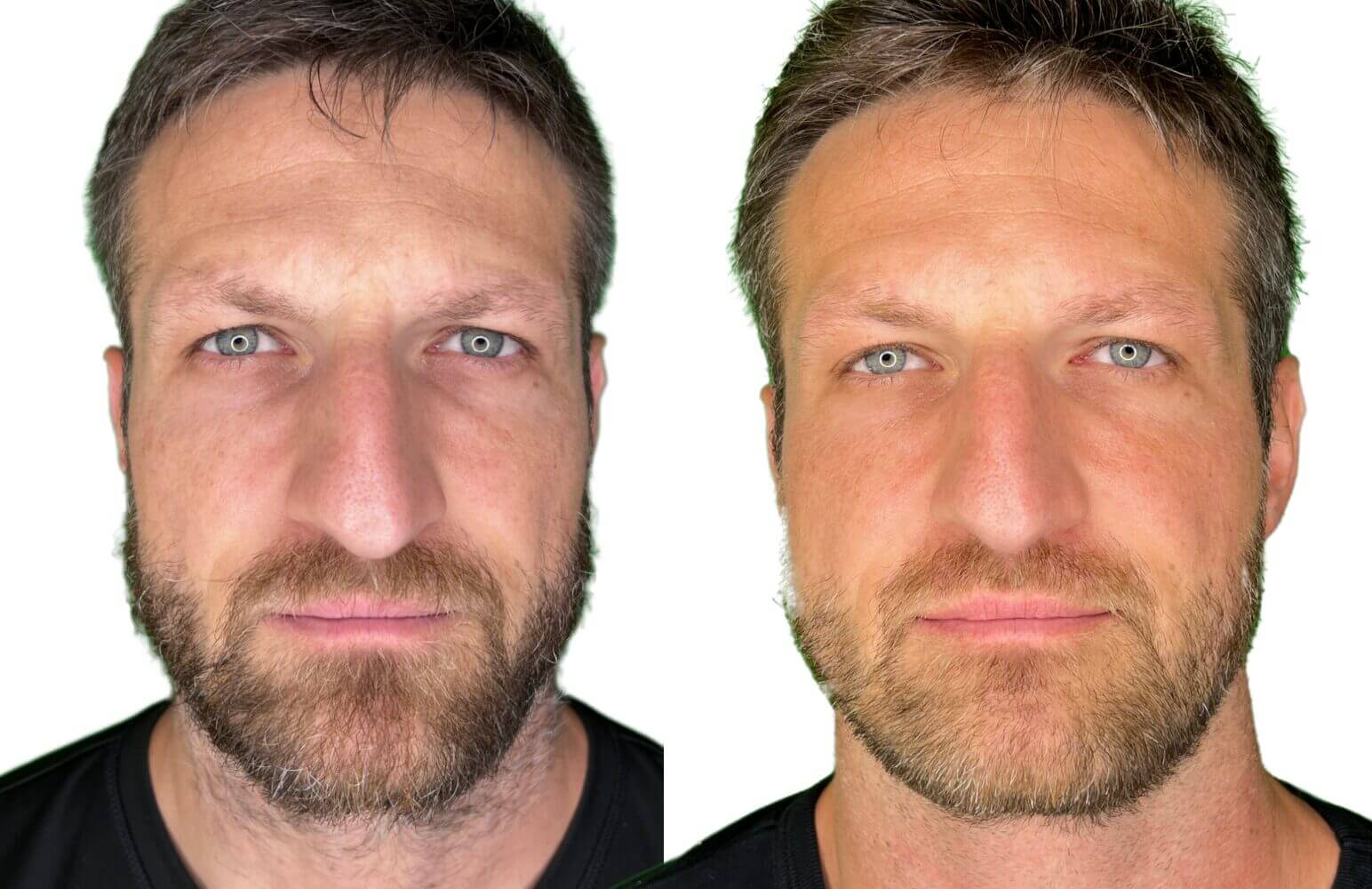
As you can see, OneSkin managed to reduce the fine lines on my forehead quite a bit.
Overall, I didn’t expect miracles but I was quite impressed by the noticeable improvements in my skin’s appearance. Since I started using OneSkin, I’ve had several people tell me that I have a more youthful appearance, even though nobody has been able to pinpoint exactly what has changed.
Looking in the mirror, my skin appears to be firmer and smoother, with softened fine lines and fewer age spots.
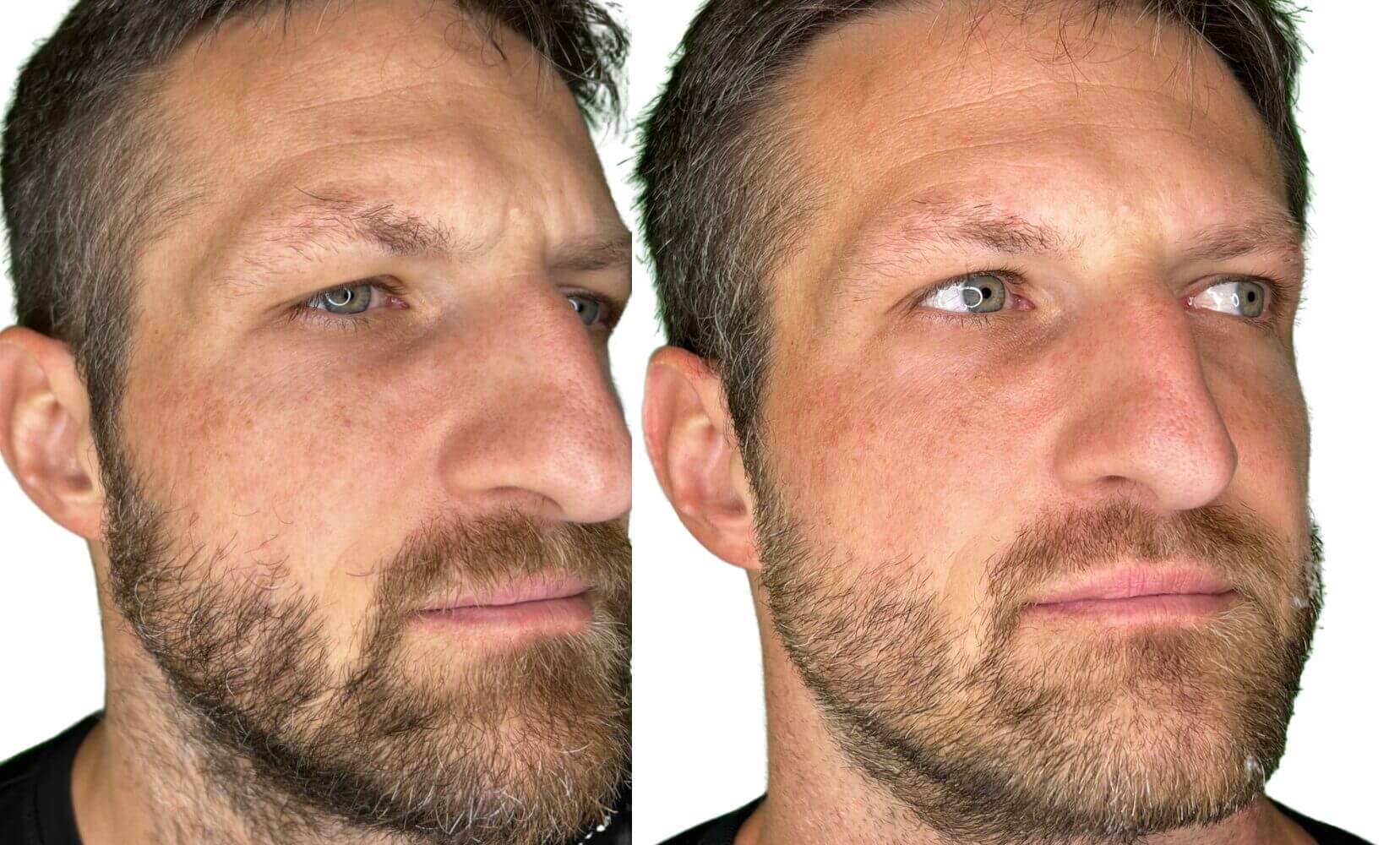
I was very satisfied with the results and continued using OneSkin, paired with appropriate dietary choices, proper stress management, red light therapy and everything else I’m doing to mitigate the effects of aging.
One thing that’s important to note is that slowing down (skin) aging is all about maintaining a somewhat stable balance between cell damage and repair. If more cells get damaged than your body can repair, you’ll age faster. As I explain in the “how it works” section below, OneSkin is all about tipping that scale in your favor.
In other words, if you stop using OneSkin, you’ll lose that advantage. I could certainly tell the difference in my skin’s appearance when I stopped using the products for a few weeks out of laziness, and then again when I re-incorporated them into my daily routine.
It’s now been two years since I began using OneSkin on a regular basis, and I still love the product. In fact, my wife (who is in her 30s) recently jumped on the OneSkin bandwagon and began using OS-01 FACE and OS-01 EYE (see below) as part of her beauty routine.
While all OneSkin products apply easily and without leaving a greasy film, I have noticed increased perspiration during CrossFit workouts if I apply the products beforehand. That’s why I now apply OneSkin after working out and showering rather than first thing in the morning.
It’s worth pointing out that OneSkin has launched several new products since I initially published this review in 2023, including OS-01 EYE and a mineral-based sunscreen (OS-01 SPF) for the face and body. So, let’s talk about those two products in more detail.
OS-01 EYE

OS-01 EYE was the third product in the company’s lineup, and I started testing it after writing the initial version of this review. What’s worth mentioning is that OS-01 EYE has the highest concentration of the OS-01 peptide, followed by OS-01 FACE.
That’s because the skin around the eyes is incredibly thin, sensitive, and prone to showing visible signs of aging. On the flip side, the company’s body lotion has the lowest concentration of the OS-01 peptide.
The nice thing about the area around your eyes is that you need only very little product to cover it. I usually use an amount equal to half an apple seed to cover the area around both eyes. Since the product stings when you get it into your eyes, I’d avoid rubbing it directly onto your eyelids, as well as working out right after applying it (because sweating can cause residual product to get into your eyes and irritate them).
I don’t use OS-01 EYE every day, primarily to avoid the potential eye irritation mentioned above. However, during the period when I used the product twice daily for two months (for testing), I noticed subtle improvements in the skin below my eyes and my temple region, including reduced fine lines and fewer dark spots.
OneSkin OS-01 SPF (Sunscreen)
OneSkin sells a mineral-based line of sunscreen that uses a combination of zinc oxide and the OS-01 peptide to protect skin from the potential damage that UV light can induce.
While I’m not a big fan of sunscreens in general, OS-01 FACE SPF and OS-01 BODY SPF (both of which are SPF 30, and also called OS-01 SHIELD) are likely your best choices if you plan to expose your skin to the sun for longer than it can handle (when you don’t have the option of using a physical barrier, like clothing).
I love how easy OS-01 FACE SPF and OS-01 BODY SPF are to apply. I don’t know what it is, but the mere thought of using a sticky sunscreen (most mineral-based sunscreens feel like shoe cream) on top of sweaty skin while being exposed to high temperatures makes my skin crawl. Ever since I was a kid growing up in Austria and driving with my parents to Italy for our summer vacation, I hated applying sunscreen.
If you feel the same, I’m happy to report that OneSkin’s sunscreen doesn’t feel heavy and greasy. We used OneSkin’s face and body SPF during recent trips to Costa Rica and Disney World in Orlando, where we were exposed to harsh UV light all day, and everyone loved it, including our kids.
Don’t get me wrong: I’m still not a fan of sunscreen and firmly believe in the importance of regular, sensible sun exposure to maintain optimal health. But I also respect my skin’s UV exposure limits, and when getting out of the sun at the right time isn’t an option, we use OneSkin’s mineral-based sunscreen to protect our skin from damage.
The Science and Research Behind OneSkin
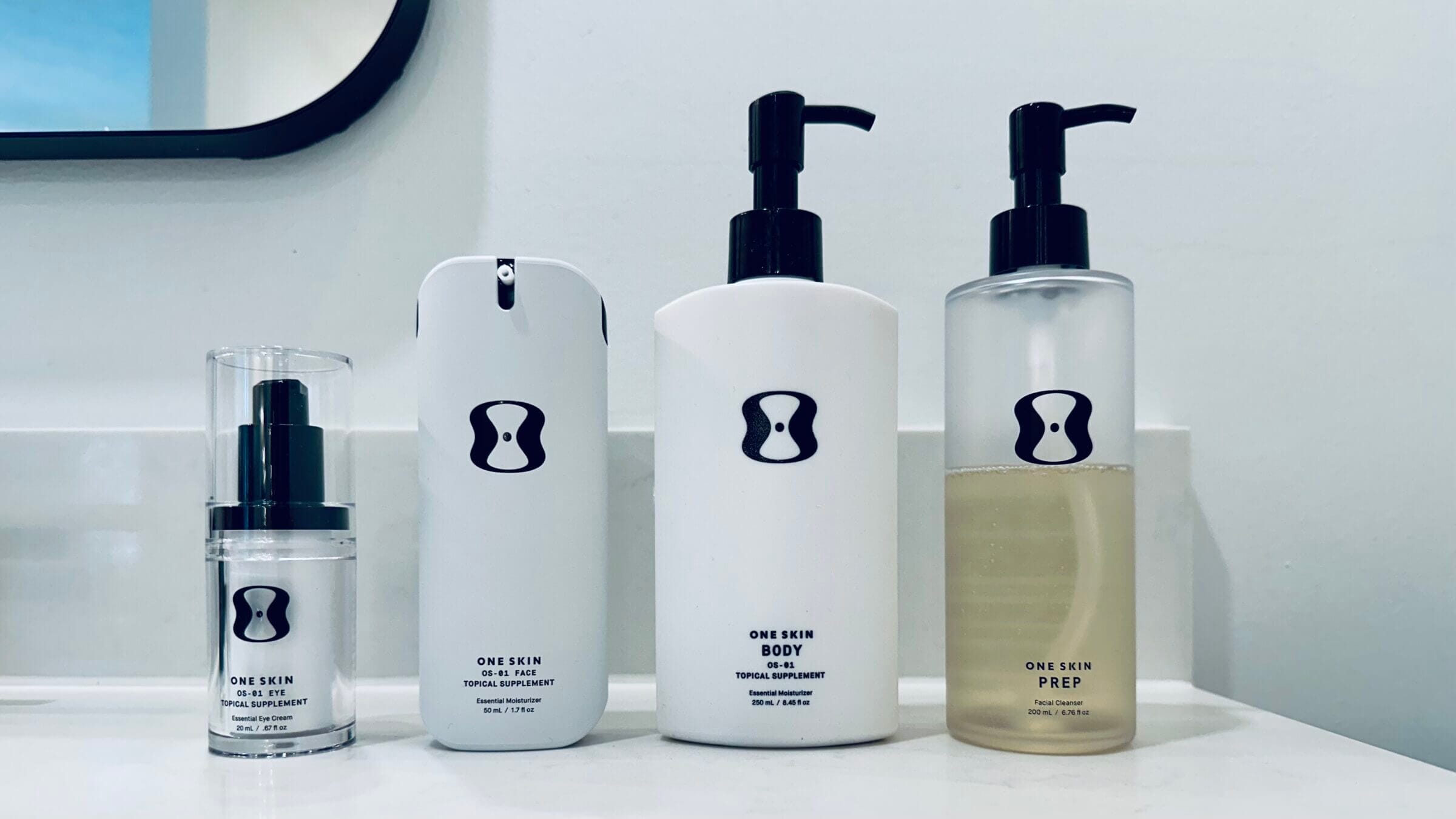
As of this writing, OneSkin offers several products as part of its skincare lineup:
- Face lotion (OS-01 FACE).
- Face wash (PREP).
- Body lotion (OS-01 BODY).
- Topical eye supplement (OS-01 EYE).
- Mineral-based sunscreen (OS-01 FACE SPF and OS-01 BODY SPF).
All of these products, except for the face wash, utilize the company’s proprietary OS-01 peptide.
OneSkin claims that OS-01 offers the following skin health benefits:
- Increased epidermal thickness, leading to fewer wrinkles and more protection against external stressors.
- Improved collagen production, leading to increased skin firmness and strength.
- Reduced DNA damage and improved overall cell function.
- Improved skin texture and smoothness, making your skin feel and look better.
- Reduced accumulation of aged and dead cells (senescent cells).
- Increased skin hydration (by preventing water loss and increasing the production of hyaluronic acid).
These claims are based on in vitro (i.e., lab-based) and ex vivo (i.e., using donated human skin samples) testing — not on living human subjects. Results from large-scale in vivo studies (i.e., research on living subjects) are not yet available.
The problem with in vivo studies on skin cell senescence is that they’re usually conducted via small-punch biopsies or micro‑punch biopsies, which are fairly invasive procedures.
So, in order to substantiate the benefits OneSkin observed in the lab (using skin models grown from donor cells), the company teamed up with a third-party contract research organization, as well as researchers from both the School of Pharmaceutical Sciences at the University of São Paulo and the Spanish National Cancer Research Center (CNIO), to design a 12-week clinical study involving 22 female test subjects between the ages of 22 and 65 with various skin types.
That study confirmed that the OS-01 peptide was effective in reducing both the visible and invisible signs of aging.
Specifically, the scientists concluded that OneSkin’s topical supplement produced the following results:
- Improved the skin barrier by 15% on average.
- Improved skin elasticity in 90% of users.
- Improved skin evenness, radiance, pores and firmness in 95.5% of users.
- Reduced the appearance of fine lines and wrinkles in 87% of users.
- Improved skin smoothness and overall appearance in all test subjects.
The results were measured using a combination of instrumental evaluation (vapor meter analysis) and a double-blind expert clinical grader evaluation.
For example, the scientists used a vapor meter to objectively measure transepidermal water loss.
However, changes in cosmetic appearance (e.g., reduction of fine lines and wrinkles) were evaluated by comparing before and after photos (much like my own testing process for this review).
Now, I know what you might be thinking: this study was sponsored by OneSkin, so the results might be skewed in the company’s favor.
There is obviously a conflict of interest at play here, and that shouldn’t be discounted.
But based on what I’ve read about how the study above was designed and conducted — combined with the results of my own testing — I believe OS-01 to be effective.
How the OS-01 Peptide Works
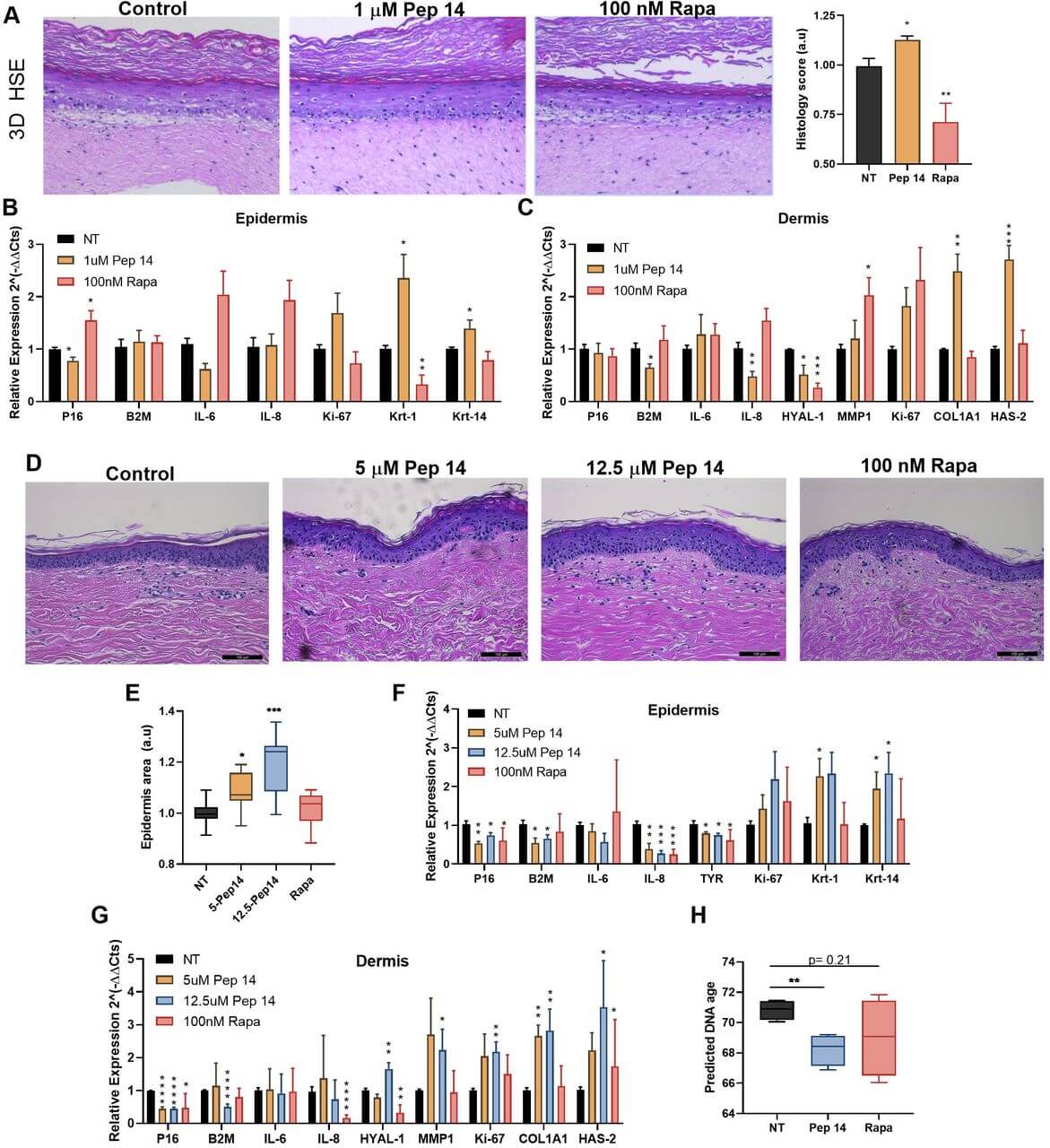
In lab-based studies, OS-01 has been shown to help reduce the buildup of senescent cells in the skin, which may slow — or potentially, reverse — certain aspects of biological aging.
Cellular senescence occurs when cells permanently stop dividing and lose their ability to function normally. In this state, they often secrete pro-inflammatory molecules that can contribute to tissue damage and accelerate aging.
Stated differently, senescent cells cause inflammation, suppress immune function and increase the expression of pro-aging genes. When that happens in skin cells, it leads to a reduced skin barrier function, impaired collagen production (leading to fine lines and wrinkles) and other issues generally associated with aging skin.
OneSkin’s OS-01 peptide reduces cellular senescence in your skin by facilitating DNA damage repair and preventing cells from secreting pro-inflammatory factors.
Just as importantly, it helps remove senescent cells that already exist.
That’s crucial, because when these malfunctioning cells are left in place, they continue to release harmful signals that degrade the surrounding tissue, hamper skin renewal, and perpetuate inflammation.
When we’re young, our body is relatively efficient at removing senescent cells. But as we age, our ability to eliminate them degrades. OS-01 can help compensate for that, thus supporting a healthier cellular environment.
OneSkin vs. Retinol
Prescription-grade retinol creams are a popular treatment option for improving the appearance of aging skin by neutralizing free radicals and boosting the production of elastin and collagen.
However, retinol doesn’t help remove senescent cells, so it doesn’t improve your skin’s longevity. Plus, too much retinol can cause side effects like dry skin, flaking and redness. As a result, I consider retinol less effective than OneSkin.
Ingredient Analysis
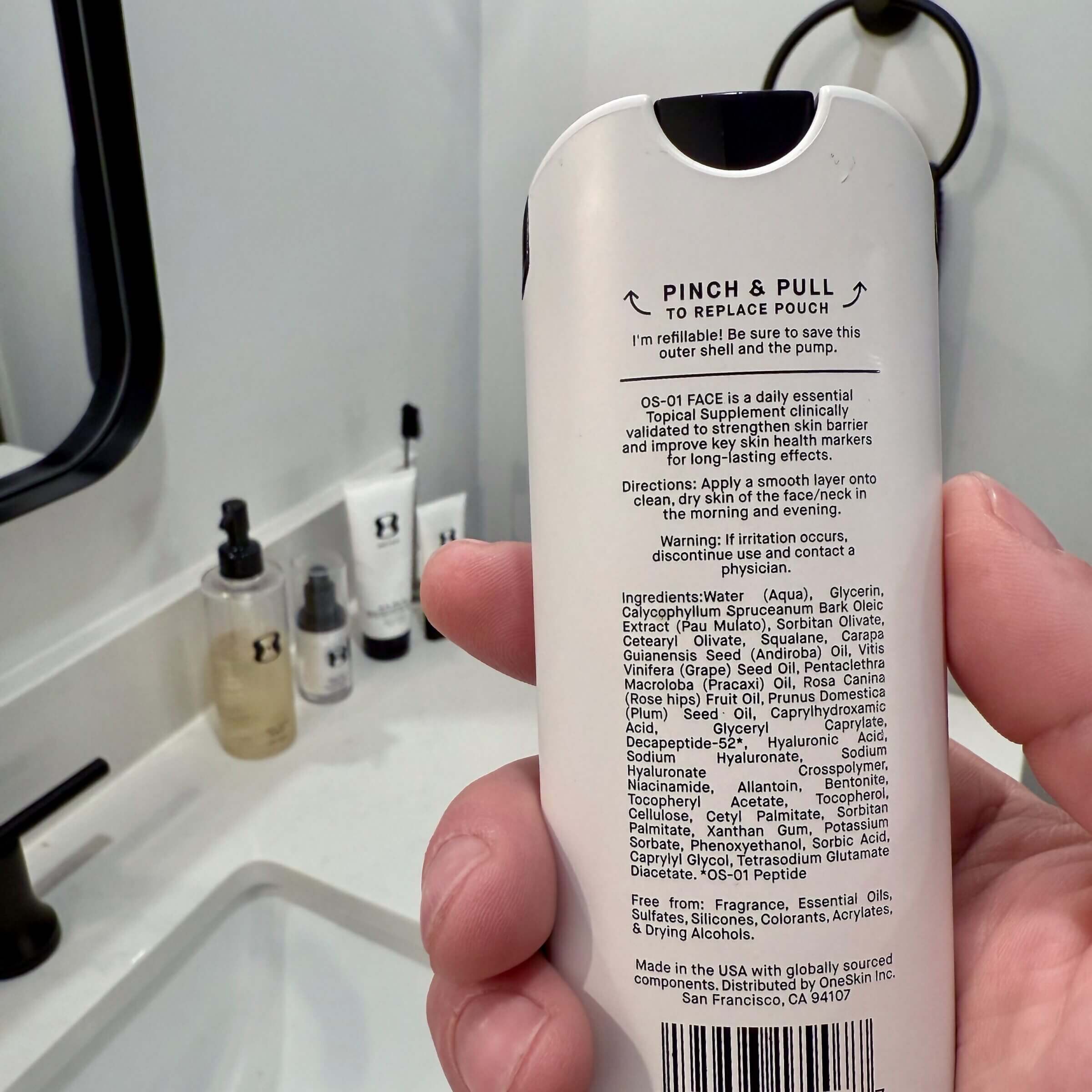
OneSkin contains a combination of active and inactive ingredients that is suitable for sensitive skin and compatible with all skin types, thanks to the lack of inflammatory ingredients and fragrances. The seven active key ingredients in OneSkin include:
- OS-01 peptide (the company’s secret sauce).
- Pracaxi oil, which has moisturizing, anti-inflammatory, antioxidant, antibacterial and antifungal properties.
- Andiroba oil, which promotes collagen production and has anti-inflammatory properties.
- Niacinamide, which also has moisturizing, anti-inflammatory, antioxidant, antibacterial and antifungal properties.
- Oleic pau mulato extract, which heals skin abrasion and smooths wrinkles by making skin more stress resistant.
- Allantoin, which helps moisturize skin and reduce irritation.
- Three sizes of hyaluronic acid to help stimulate collagen and elastin production and maintenance, and to aid in epidermal regeneration, stem cell maintenance and moisture retention.
Aside from these active ingredients, OneSkin’s face lotion also contains a few dozen inactive ingredients, including thickeners and preservatives.
Any time I pick up a skincare product, I pay especially close attention to the list of (often cryptic) inactive ingredients, because that’s how most skincare manufacturers sneak in chemicals that can be detrimental to your health.
While you can look up the ingredients list on the OS-01 FACE product page, I only noticed one ingredient that looked suspicious: phenoxyethanol, an antimicrobial preservative.
If you’ve read my article about the endocrine-disrupting properties of xenoestrogens, you might remember to steer clear of any ingredients that contain the prefix “phen.”
So I dug a little deeper and learned that phenoxyethanol can be problematic in very high doses. However, you’d need about 200 times the amount of what OneSkin puts into its lotion to trigger any adverse systemic effects.
That’s why the European Scientific Committee on Consumer Safety declared phenoxyethanol safe for all consumers. Knowing that Europe is much stricter when it comes to banning potentially unhealthy ingredients in cosmetic products, I feel at ease putting phenoxyethanol on my skin.
Overall, I consider OneSkin’s products safe for daily use thanks to their clean ingredients. And I also appreciate that OneSkin is a cruelty-free brand and does not test any of its products on animals.
OneSkin Pricing and Discount Code
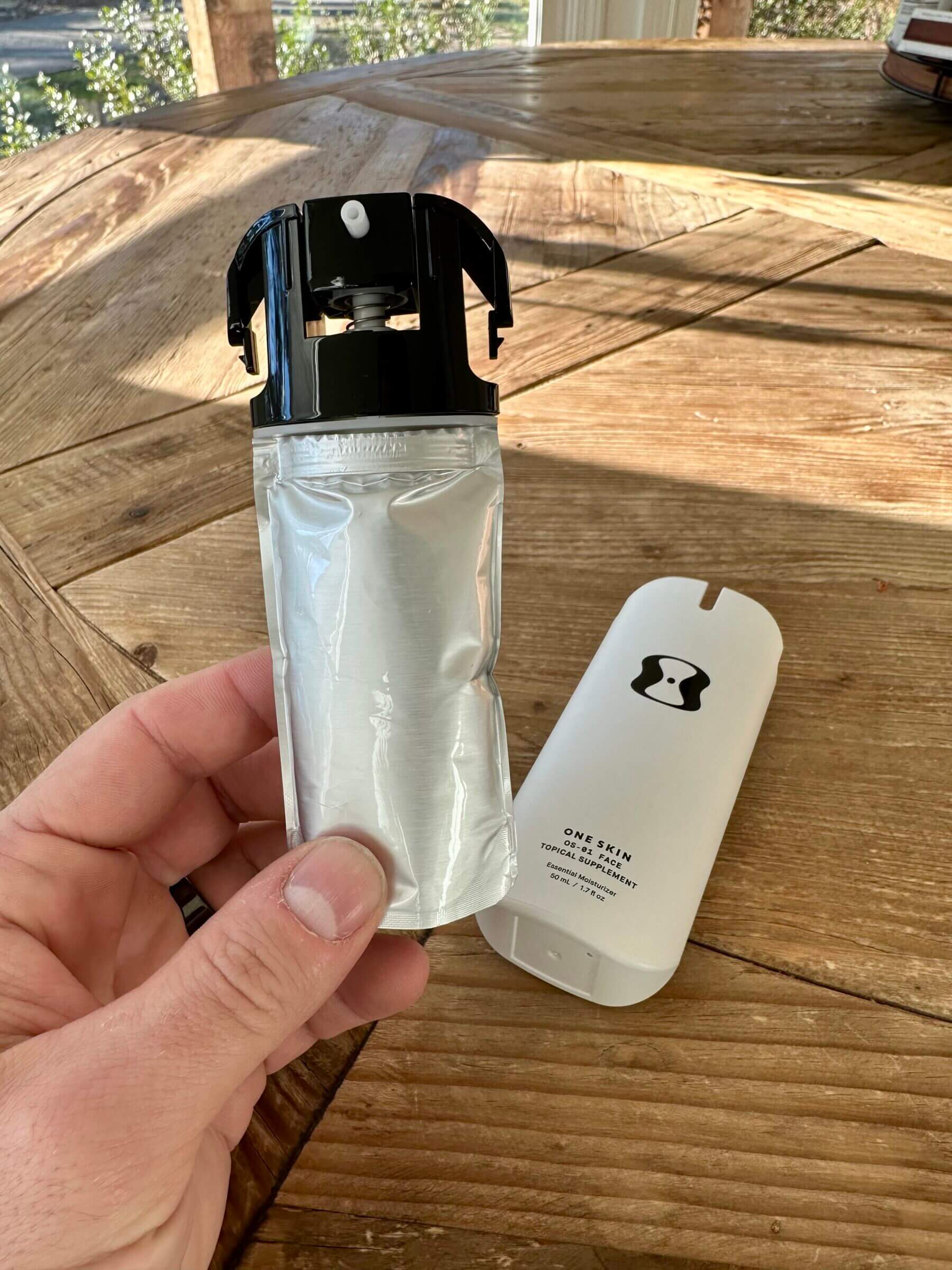
The only downside to OneSkin’s OS-01 skincare products is the price tag. At $120 for an OS-01 FACE starter kit (the refill pouch costs $117), it’s not exactly cheap compared to the products you’d find at your local Walmart or Walgreens.
However, comparing OneSkin to drugstore skincare products wouldn’t be fair. It’d be more appropriate to compare OneSkin to other high-end products, including Chanel’s Hydra Beauty Micro Crème (which retails for $100) or the Sublimage La Crème, which Chanel claims is the ultimate skin regeneration product. The latter retails for a whopping $475 (up from $420 when I first wrote this article) and contains a cocktail of endocrine-disrupting chemicals that are anything but healthy for your skin.
So from that perspective, I consider OneSkin reasonably priced. Additionally, you can sign up for a 30, 60 or 90-day subscription and shave approximately 20% off the one-time purchase price.
You can also save 10% off the retail price by purchasing one of the many bundles OneSkin offers. For example, you can get the OS-01 FACE + OS-01 EYE + OS-01 FACE SPF + OS-01 BODY + PREP Cleanser bundle for $375, which is 12% cheaper than purchasing each product individually.
Additionally, OneSkin agreed to offer my readers an extra 15% discount if you use code PRIMALSHIFT. The code is valid for your first order and applies to the entire cart.
The good news is that you can combine bundles, subscriptions and my discount code for significant savings.
For example, if you purchase the bundle mentioned above as a subscription and with my promo code, you can get it for $291 instead of $375.
OneSkin can be purchased on Amazon, but you won’t be able to use my discount code there.
Reusable Packaging
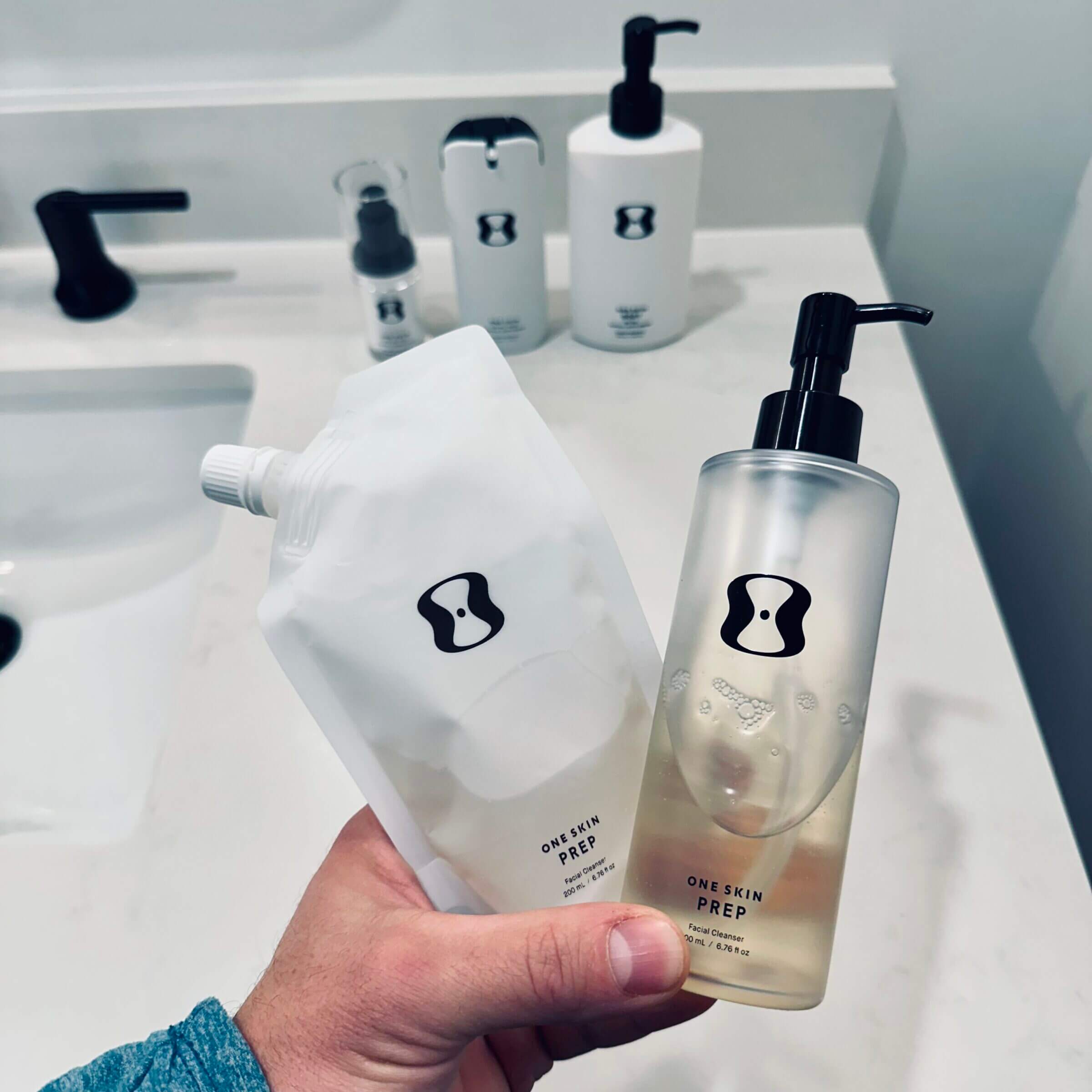
One complaint I have about expensive skincare products is that they often come in packaging that makes it impossible to use the entire contents. That’s particularly true for products that come in a hard plastic shell with a pump.
Fortunately, OneSkin decided to use sustainable packaging for many (but not all) of its products. This packaging gives you visibility into the amount of remaining product, as well as the ability to squeeze out every last drop from the pouch. As a bonus, you can help reduce plastic waste by keeping the outer hard plastic shell when you order refill pouches.
The only OneSkin product I have to cut open in order to access the last bit of lotion is OS-01 BODY. I hope OneSkin will consider updating the OS-01 BODY packaging to make it easier to squeeze out all the lotion without having to cut open the plastic shell.
Overall, I wish more skincare companies would follow in OneSkin’s footsteps to increase their product value and reduce plastic waste.
Final Verdict: Is OneSkin Worth It?
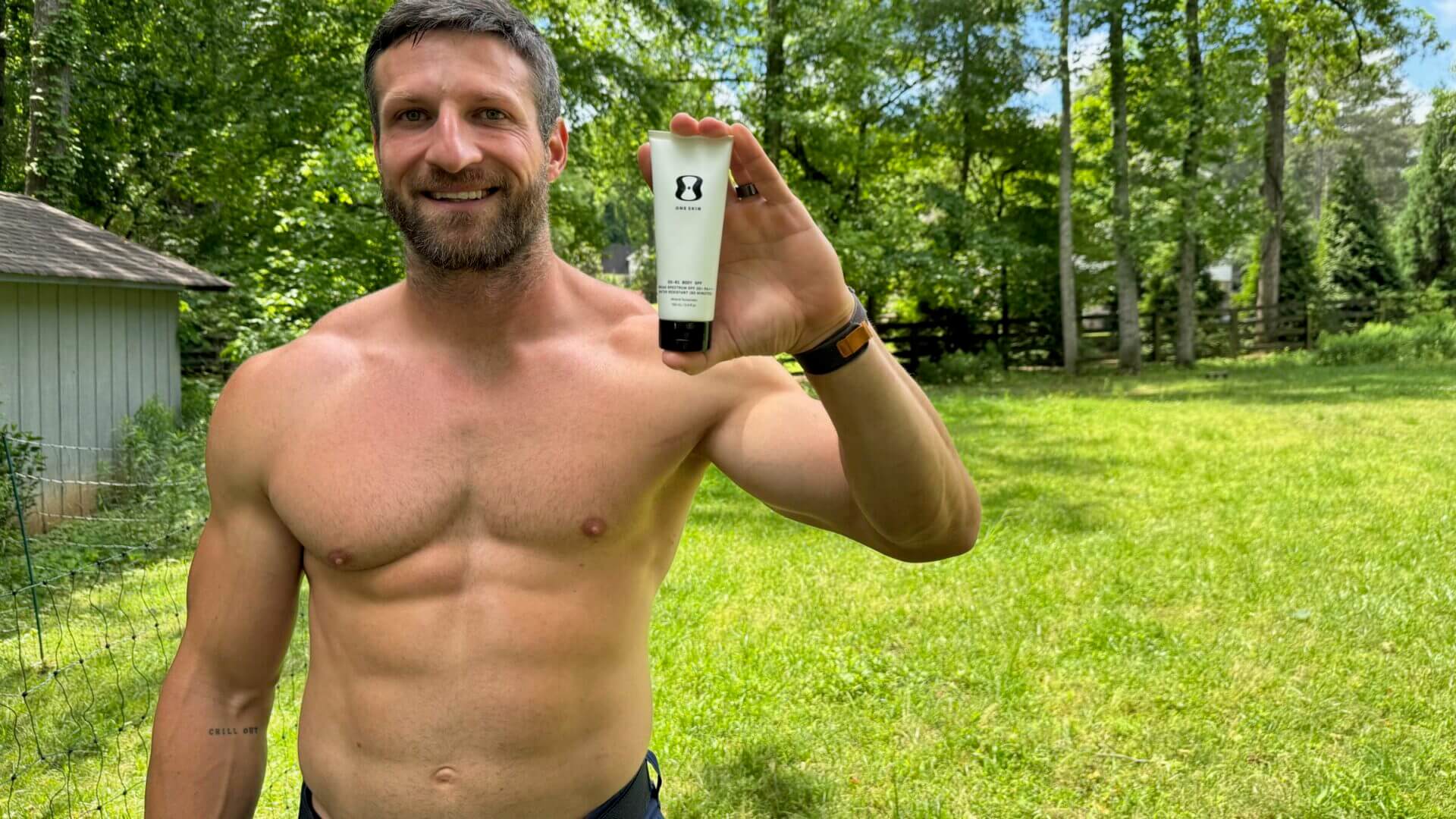
I do my best to mitigate skin issues by following an animal-based diet, avoiding processed foods and seed oils, using a combination of natural sunlight and red light therapy devices and limiting my alcohol consumption (to name a few of the strategies I employ). But there’s still room to improve my skin’s biological age by addressing senescent cells.
That’s why I’ve made OneSkin a regular part of my skincare routine.
Dead skin cells are like a bad apple in a basket full of good apples. The one bad apple can cause the surrounding apples to spoil quicker. Senescent cells behave in a similar fashion, as they excrete inflammatory substances that can negatively affect the surrounding cells.
OneSkin’s topical face supplement (OS-01 FACE) helps me to get rid of the senescent cells in my skin before they can cause damage, thus supporting my skin’s natural rejuvenation and “skinspan.”
My skin started looking better after just a few weeks of treatment, and I have experienced no adverse effects (nor any decreased effectiveness) after two years of daily use.
If you’re trying to improve the appearance of your skin and you’ve already laid a solid foundation through proper diet, stress management and good sleep, I’d recommend you give OneSkin a try.
Just don’t expect miracles if your lifestyle isn’t in line with your skin health goals.

Michael Kummer is a healthy living enthusiast and CrossFit athlete whose goal is to help people achieve optimal health by bridging the gap between ancestral living and the demands of modern society.
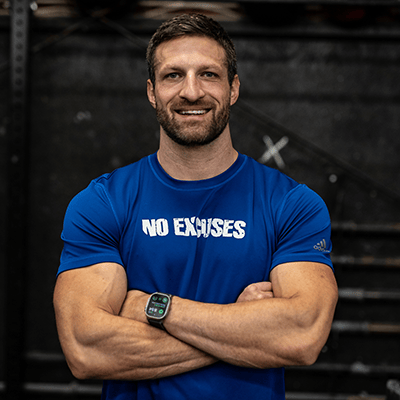
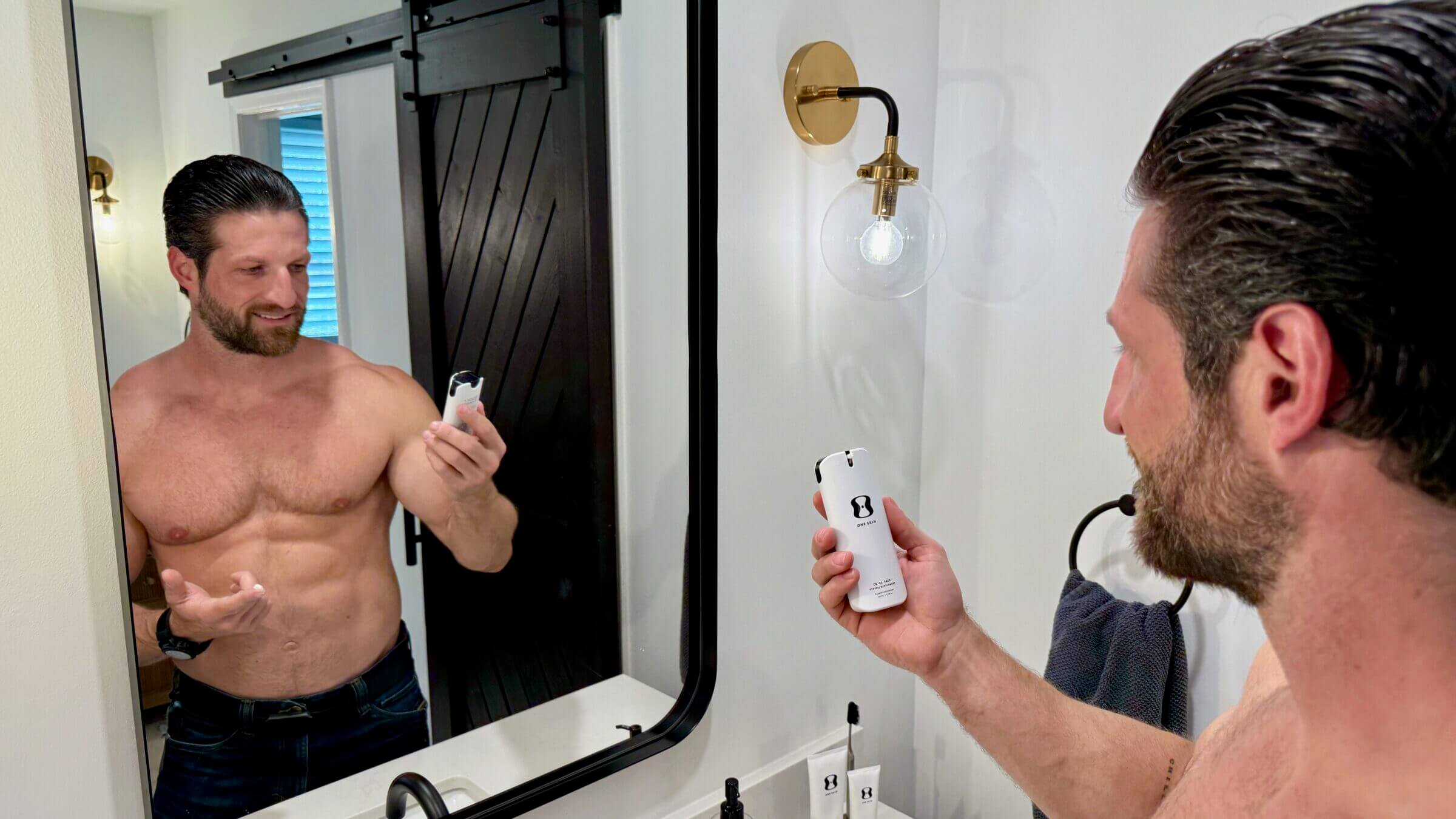

Hi! Will this be covered by HSA in the future?
That would be a good question for OneSkin: https://www.oneskin.co/pages/contact-us
I literally came to One Skin’s website to purchase their product until I read your ignorant comments and “dismisinformation” about sun exposure. Now I simply cannot justify spending my hard earned money on a spokesperson who spouts such utter nonsense. You sound like a six old. My god.
I know that critical thinking and questioning main stream health advice is not everyone’s cup of tea. But if it makes you feel any better, One Skin doesn’t share my opinion on sunscreens either. In fact, they’re working on one :)
Thank you for such a detailed review. It is much appreciated!
You’re most welcome, Donna!
I really strongly suggest that you make the os1 body in a refillable package. I’m on my second one and it seems almost empty but when I take the pump off and shake it upside down, I can get almost another weeks worth of product out!!!!
Thank you for your consideration. Lily Meadows
At this time my goal is for face and neck. I am a older female. what would you recommend.
Hey Peggy,
OS-01 FACE Topical Supplement would be my recommendation! See https://michaelkummer.com/go/oneskinshop
Cheers,
Michael
I completely agree with you. I’m constantly bombarded with people who think like the person you responded too. The sun has always been here. It heals us. It can even heal the skin . I’d say a majority of sunscreens contain cancer causing ingredients.
Hi Michael! What is the best way to incorporate OneSkin into your morning and evening skin care routine? Should you place this on clean skin immediately after cleansing Prior to serums? Is it effective if you apply it after serums or mix with other moisturizers? Thank you in advance, great review!
Hey Elle,
I’m by no means a skincare expert but One Skin recommend applying their products directly on clean skin. So I’d apply your serums after the lotion.
Cheers,
Michael
Michael, your photos have very different lighting. I am in my 50s and I can find photos have my face where I look so much younger than others. It’s all about the lighting. I used One Skin for 12 weeks and saw no difference.
Hey Anne,
I actually took both photos under the exact same lighting conditions (in my YouTube studio) but using two different generations of iPhone (which likely explains the difference in white balance). Have you reached out to One Skin to discuss your results (or lack thereof)?
Cheers,
Michael
Hi Michael,
Thank you for all of the above, extremely helpful. One thing I didn’t see you mention is wearing sunscreen daily. Believe me, it makes a significant difference in the appearance of your skin. Most important, it greatly decreases your likelihood of developing skin cancer. So excited to see what OneSkin can do.
Kind regards,
Cheryl
Hi Cheryl,
Thanks for stopping by! Sun exposure doesn’t cause skin cancer. It’s a myth that I debunked in one of my newsletters that, unfortunately, isn’t available online so I can’t link to it. The skin is perfectly capable of defending itself against UV rays if you consume an appropriate diet and don’t wear sunglasses (which inhibits the signals to release melanin). I’ve not worn sunscreen in two years, spend a lot of time in the sun (without a shirt) and never burn. I should probably convert that newsletter into an article to I can link to it and the scientific evidence behind my claims :)
Cheers,
Michael
You are a moron. There are literally 1000s and 1000s of scientific papers about the harmful effects of UV rays on the skin and association to skin neoplasms. LOL. It’s not about just burns, it’s about longterm, cumulative exposure to UV rays.
Don’t spread misinformation.
Have you ever asked yourself the question why skin cancer wasn’t really a thing before the invention of sunscreens and why the rates of skin cancer has skyrocketed over the past few decades despite the proliferation of sunscreen availability and use?
I don’t disregard the potential of UV light on human skin cells but evidently, humans have developed defense mechanisms to protect the skin against them (e.g., melanin).
On a side note, I’ve heard that One Skin is working on a sunscreen…do you think they’d pay me to say what I said about sunscreens?
I think you would benefit from spending some time on questioning common medical advice and trying to understand the differences between clinical trials vs. observational studies and why correlation isn’t the same as causation.
Rates of skin cancer have increased in recent decades for two reasons 1) UV radiation is higher because of the hole in the ozone layer 2) we actually know what to look for when someone has skin cancer (usually it starts of as a mole that’s an odd shape) and in Australia people get yearly skin cancer checks to catch this quickly before the cancer spreads to the rest of the body (which is what would’ve happened in previous generations).
A hundred years ago there was no hole in the ozone layer. It was noticed in the 80s. That’s why the sun is harsher in Australia/Southern hemisphere. There are plenty of Aussies who go to the US and are shocked that you don’t burn in the sun the in the same way as AUS. The ozone is known as the earths sunscreen (Google it). Your weather bureau should have a UV index for each day and it will differ for where you live and the weather of the day. Even on overcast day can have high UV rays. In an Australian summer the UV radiation is so high from 9am to 5pm on most days so you need sunscreen or you will burn but in winter you can go outside and not get burned (Melbourne) although now they are recommending sunscreen all year round. So if you haven’t been sunburned for not wearing sunscreen for two years that could mean 1) UV index is low where you live 2) you’re not outside when the UV is highest. You most likely are still damaging your skin even without the burning. That healthy tan is skin damage. You can easily get a UV skin scan and see the damage the sun has done, I’m sure you’ll be shocked by how awful your skin truly is, as most adults are. Most sun damage is done when you’re a child up to early twenties (less sunscreen used and more time outside) and skin cancer doesn’t appear for many many years (usually over 50years old when they show up). The other reason skin cancer is more diagnosed now is we actually know what to look out for. Every year I get a skin cancer check (and everyone should) where any moles on your body are checked to see if they have changed in size/shape/colour. If skin cancer is left untreated it can cause the cancer to spread to other parts of the body. So readers, just because someone with no medical background except for googling says they haven’t put sunscreen on for two years and they haven’t been burned, seriously question this and get the facts. Also check their age, these problems show up after 50/60 years old once aging has truly begun after years of skin damage. Anyway, if you’re in a moderate to high UV exposure area, wear sunscreen.
Also, I hear once you’re over 40 you cannot produce Vitamin D from going out in the sun so keep that in mind.
Hey Sophia!
I appreciate your response! One thing you don’t seem to appreciate is that (skin) damage isn’t always a bad thing. Much like exercise damages muscle tissue, it’s an important factor in triggering repair and making you more resilient. The key is to keep the rate of repair above the rate of damage. UV damage of the skin follows the same principle. As long as your body repairs the damage at a higher rate than what’s inflicted, there is no issue. And much like muscle growth is a sign of a positive ratio of repair to damage, skin darkening is a sign of improved resilience to UV radiation, not a sign of cancer-causing damage.
I certainly agree that there is such a thing as too much UV radiation, not exposing your naked skin to natural sunlight carries a significantly higher risk to adverse health outcomes than doing so.
Also, I don’t know where you heard that your body can’t produce Vitamin D once you’re over 40. I’m 41 and produce plenty of Vitamin D from regular sun exposure and sufficient fat (plus cholesterol) intake. I know because I do thorough blood panels every three months (see https://michaelkummer.com/metabolic-health/).
Last but not least, if you feel like wearing sunscreen because you’re in the sun for longer than your body can handle, make sure it’s a non-toxic version. Most sunscreens contain endocrine disruptors that increase your risk of developing cancer more than sunburns.
I completely agree with you. I’m constantly bombarded with people who think like the person you responded too. The sun has always been here. It heals us. It can even heal the skin . I’d say a majority of sunscreens contain cancer causing ingredients.
Very well thought out and kind response, not reaction, to a non-kind comment. Well done and good on you for not taking the bait to get into an immature bickering online. That said, I’d be very interested in reviving your newsletter on you debunking skin cancer via sun exposure. Thank you.
I’ll talk about it on an upcoming podcast episode: https://www.primalshiftpodcast.com/
Hey Michael, there’s also the factor of UV rays being much stronger. I lived in Australia and it is still has one of the highest rates of skin cancer in the world.
Just say’n :)
I don’t doubt that the UV index plays a role but it doesn’t change the underlying mechanisms. Obviously, if you do all the things you’re not supposed to, you’ll likely see more damage when the sun is stronger.
I must agree with Edwin, but not with the moron part. I would care to believe, that perhaps you never, ever read one sentence regarding Sun exposure. I bet if you google the word sunscreen you’d find oodles and oodles of info about sun exposure and the importance of using sunscreen. Just a thought.
Oh my, why didn’t I think about googling sunscreen before making important health decisions. But here is another thought: Rates of skin cancer were negligible before a few decades ago. Humans and our early ancestors have lived under the sun (without sunscreen) for millions of years. Since the introduction of sunscreen, rates of skin cancer have skyrocketed (despite its wide use). The skin has natural protection mechanisms against UV light that happens to get inhibited by wearing sunglasses (UV light in the retina sends a signal for the body to release melanin), consuming seed oils (aka vegetable oils) and other inflammatory foods, and the avoidance of sun in general (UV resilience has to be built up).
On a side note, pretty much all sunscreens contain either carcinogenic or endocrine-disrupting chemicals (in most cases, both), including the mineral-based ones.
So while I appreciate your opinion, as misinformed as it might be, I recommend taking a few minutes each day and doing some serious research on important topics concerning your health and trying to understand the differences in scientific research quality.
I did some research. Sunglasses do not inhibit melanin production, however, sunglasses are beneficial in preventing UV exposure to the eyes.
Hey Vicky,
while wearing sunglasses with UV filter lenses do not BLOCK melanin production, they most certainly inhibit it. Sunlight is detected in the retina. In response to intense or prolonged light exposure, your brain can ramp up production of hormones—including the melanocyte-stimulating hormone (MSH)—that encourage higher melanin levels in the skin. When you wear sunglasses, especially those with strong UV and visible light filtering, the retina perceives less intense light. As a result, your brain sends a milder “sunlight is strong” signal and does not boost melanin production to the same degree.
Cheers,
Michael
Did you pay for this product or was it give to you for this review?
Hey David,
One Skin sent me their products for free. That’s how it works with the majority of the products I review. However, I don’t publish reviews for products I don’t like and that’s why you don’t see any negative reviews on my blog. I hope that helps.
Cheers,
Michael
LOL. You are horrible. A paid phony.
interesting information.
(a) regarding your comment on the one “phen” ingredient, you wrote:
“So I dug a little deeper and found out that phenoxyethanol can be problematic in very high doses. However, you’d need about 200 times the amount of what OneSkin put into its lotion to trigger any adverse systemic effects.”
Do you know if the topical application and resulting absorption is cumulative? If so, would that not mean that 200 applications would be problematic? or 200 bottles? or does a single application “dissipate” before the next application, and therefore would not be problematic?
(b) for a female, much older than yourself, whose skin did not age very well, resulting in wrinkles and much looser skin than you, do you have any knowledge of the best type of products available? From your images and text, it appears that you had good results when it comes to discolored skin, but your before picture did not really show wrinkles or sagging/loose skin.
thank you for reporting on your experiences
Hey Joe!
a) Great question! The studies I’ve seen didn’t indicate any accumulative effects.
b) I’d combine red light therapy with a high-quality topical and increase my collagen and micronutrient (vitamins, minerals) intake. Check out the following links for products I recommend:
– https://michaelkummer.com/best-red-light-therapy-devices/
– https://michaelkummer.com/best-collagen-powders/
– shop.michaelkummer.com: I’d look at Beef Organs and Bone & Marrow.
Cheers,
Michael